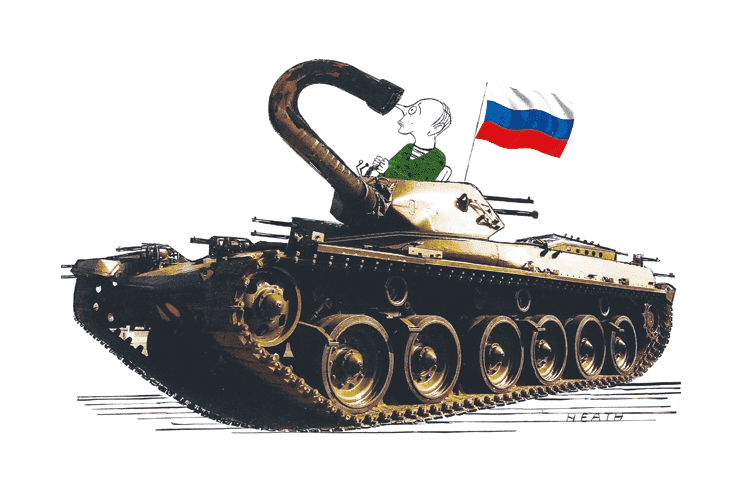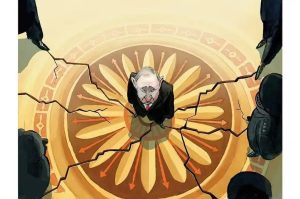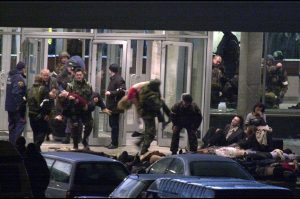Almost everyone has known that the city of Kherson, stranded on the right bank of the Dnipro River, was all but indefensible. Now it looks as if the one man who, like Canute was setting himself against the tide, has finally acknowledged that: Vladimir Putin has let his generals withdraw. This could conceivably be some cunning ruse, but the odds on this are lengthening.
Putin, though always willing to let his henchmen hurl themselves on grenades in his name, was happy not to be visibly connected with the decision. Instead, in a piece of awkward uniformed theater, overall field commander General Sergei Surovikin, recommended “to assume defense along the left bank” of the river, citing the need to minimize civilian casualties and to preserve “the combat capability of the group of forces.”
Defense minister Sergei Shoigu somberly ordered him to “start withdrawing the troops and take all measures to ensure the safe relocation of the personnel, armaments and hardware behind the Dnipro,” as if this had not been decided in the Kremlin rather than there in the command post of the so-called Unified Group of Forces in the Zone of the Special Military Operation in Ukraine.
This way, the inevitable anger of the nationalists will be directed at Shoigu and Surovikin, redoubled if this goes badly. After all, it seems to be the lot of Russia’s senior military figures these days to be Putin’s flak vest. The commander-in-chief, the man who just at the end of September announced that “residents of Donetsk, Luhansk, Zaporizhzhia and Kherson are becoming our citizens forever,” was conspicuously absent.
This is a military defeat, but not necessarily a decisive one. Much will depend on how far the Russians can manage an orderly retreat rather than a rout. One would expect that they have planned this through, withdrawn stocks of materiel and ammunition that they don’t want the Ukrainians to take, perhaps even decided to commit more of their generally risk-averse aircraft to covering the retreat. In fairness, though, the Russians have committed enough elementary blunders in this war that none of this can be guaranteed. Besides, a retreat under fire — and especially one which involves crossing a river — is one of the hardest moves to pull off. The temptation is to think that the real question is just how badly they will handle it.
If it works, then the Russians will have surrendered the only major city they had taken in this invasion, but now have a chance to consolidate along a more viable defensive line along the Dnipro. They have already been preparing, building defenses and evacuating civilians to create free-fire zones and also so as to use emptied homes to house troops during the coming Ukrainian winter.
The 80,000 or so mobilized reservists who have been rushed to the front lines have been taking horrific losses, but if settled into proper defensive positions, with at least adequate food and shelter, they may have some military utility.
Of course, Putin cannot associate himself with a narrative that is, in effect, about a smallish retreat in the hope of trying to avoid a rout — it is much too unheroic. Instead, as much for political as strategic reasons, we are likely to see a further escalation of the kind of bombardments by kamikaze drone that have been hammering Ukraine’s infrastructure.
As well as a sop to the nationalists in Russia, this is to try and divert resources in Ukraine and cause more dilemmas for the West. There is a limit to how much practical assistance that can be provided — there are only so many diesel generators that can be rushed there, for example, and only so much diesel. Putin’s hope is that widespread power cuts may generate a massive new wave of refugees heading west at the very time when governments and societies are already feeling the pinch. It is extremely unlikely that this will seriously undermine support for Ukraine, but Putin is going to clutch at whatever straws he can.
For the moment, though, we shall have to see if and how the Russians withdraw from Kherson, and how great a toll the Ukrainians can inflict on them in the process. It is too much to say that Shoigu’s and Surovikin’s futures hang in the balance, but as the front lines roll back, Crimea comes ever more clearly into play — and that is likely to be a prize Putin will feel he cannot afford to relinquish. Watch this space.
This article was originally published on The Spectator’s UK website.

























